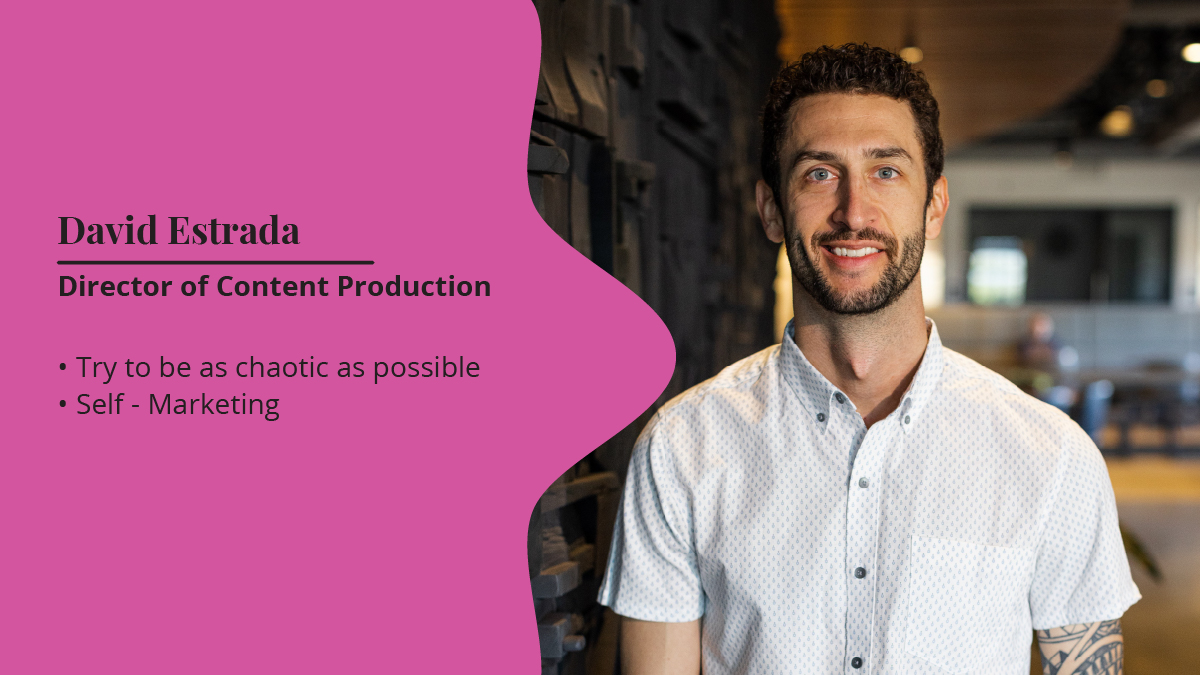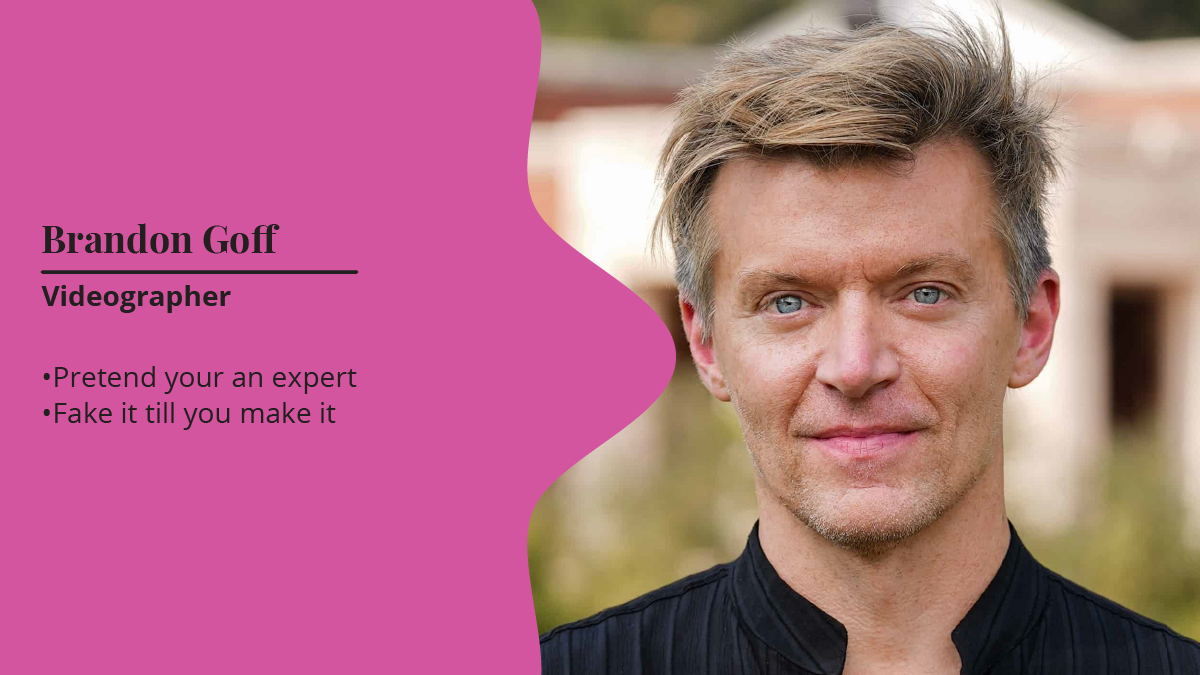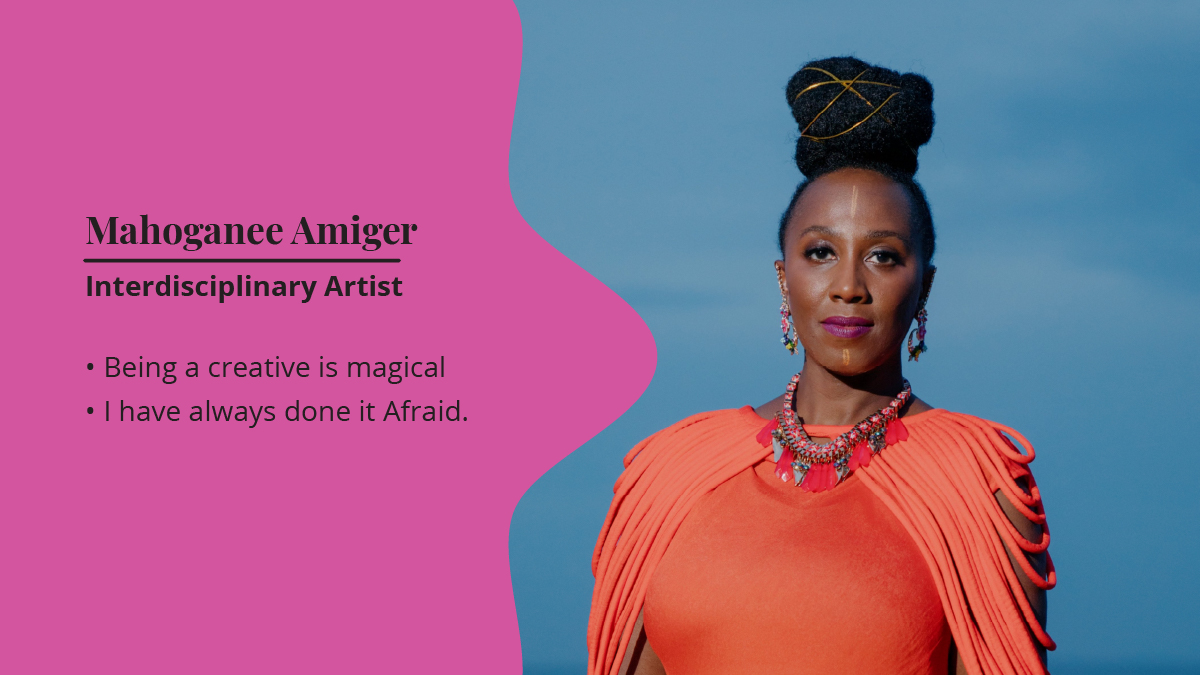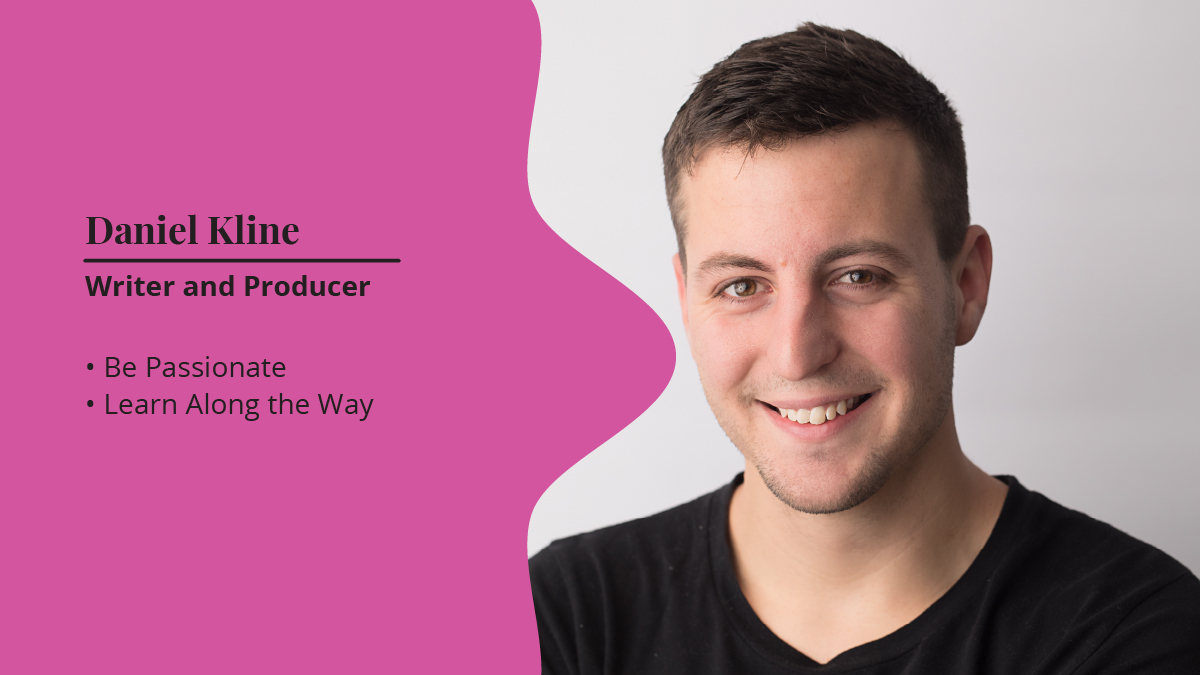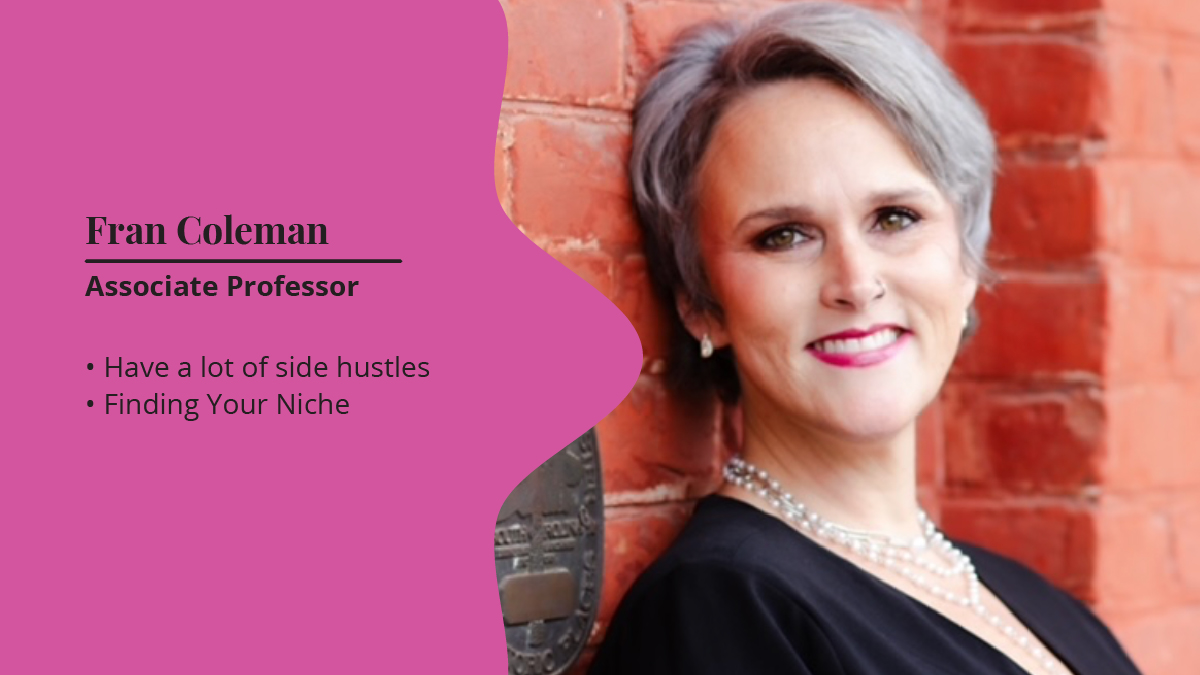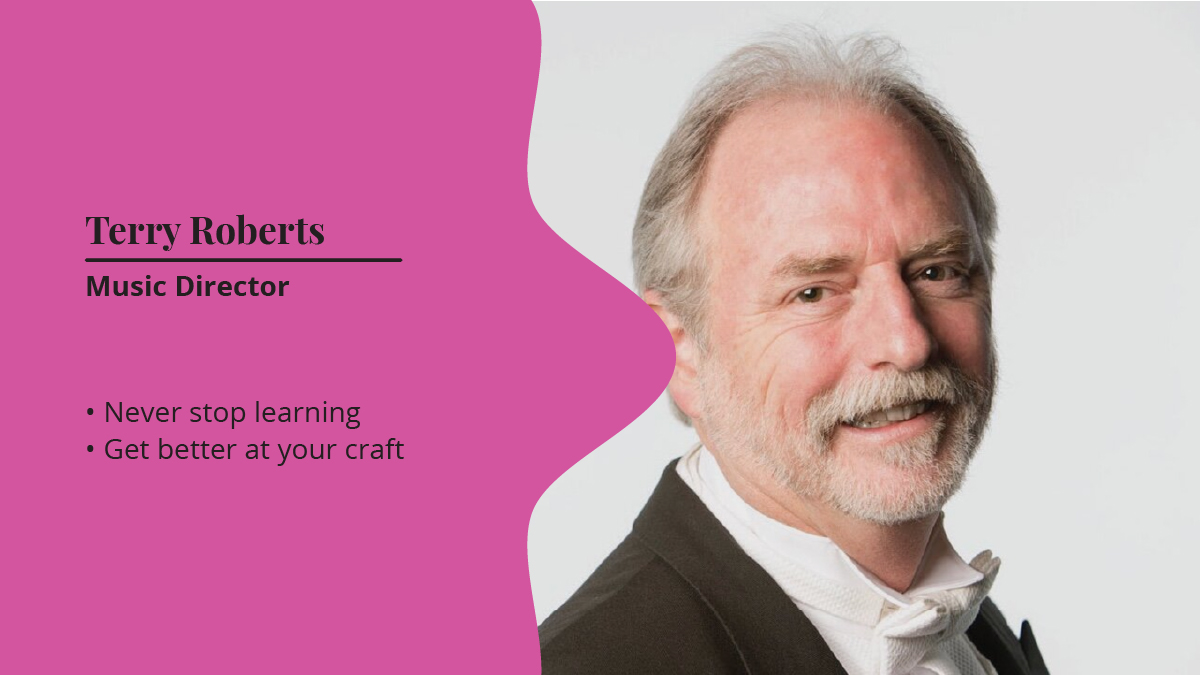“I would define my creative success; I think it’s that I try to be as chaotically scheduled as possible.”
Interview
Transcript
Lexi Raines 00:00
David. Okay, so first, just give a little introduction of yourself, like, what’s your name? Who do you work for? And where are you currently working from?
David Estrada 00:11
Yeah. So my name is David Estrada. I am the director of content production at Cargo in Greenville, South Carolina, and it’s a marketing firm that’s been around since 2006
Lexi Raines 00:25
Okay, so have you been working there since 2006 or how long have you been- How long have you worked there?
David Estrada 00:33
I’ve been working at Cargo since April of 2016 so about 10 years after it started, I came on board. It was a company of about 15,12 to 15 people and since has, you know, I’ve been there about nine years, and it’s grown at one point. At its largest it was like 75 people, and now we’re back to under 50. I was pre-COVID. Now we’re back to just under 50.
Lexi Raines 01:06
Yeah, that’s still like a lot of growth, though and COVID impacted so many different things so for sure. So what’s one thing that you love working you- that you love about working as a creative in South Carolina?
David Estrada 01:21
Yeah, one thing that I love about working as a creative in South Carolina, wow. You know, there’s so many things that come to mind. I studied film, radio, television, film, studied advertising. Got two different degrees at the University of Texas, you know, way back when, and never really thought that things would pan out to where I was doing both of those things at one location. You know, at one job, it’s one of those things where you- you hear stories about how people study a certain thing and they get into a totally different field. And so I just feel very lucky, very, you know, blessed, I guess, to be able to be working in in the creative field like I hoped and intended to but as far as like, yeah, the creative field in South Carolina specifically, I like that there is a base, a very good baseline, of creative professionals and strategic professionals in upstate South Carolina, and I can’t really speak from any real experience in the coastal or midlands area, haven’t worked in those regions, but in the upstate, it’s- it’s nice to be surrounded by folks with so much experience to be able to learn from and I don’t know that you necessarily get that in every region, every market, yeah.
Lexi Raines 03:10
So would you say that’s like, it’s unique influence on you compared to being anywhere else?
David Estrada 03:18
Yeah, you know, this area, I guess, has the- the benefit of, at one point in history, there was a very large amount of advertising being done on a national scale from one particular agency called Henderson advertising, and there was just a lot of money coming through the area for that, and that agency, I think, collapsed back, I don’t want to misspeak on what year that happened, but it shut its doors, and from that, a lot of other like smaller agencies and professionals that learned from being at that shop kind of fragmented off and started their own shops. So now there’s just a very robust community of advertisers you know, marketing and advertising agencies.
Lexi Raines 04:22
Yeah, that’s awesome. So, could you go into like, a little bit more detail about the profession, the community there?
David Estrada 04:31
Definitely, yeah, you know, it’s, it’s a, it’s a small, I mean, you know, it’s a small place. So it feels like everybody has kind of worked everywhere, at all the different shops. Everybody kind of knows each other, or has at least heard of each other the like I said, there’s a mix of video production strategy, design, copywriting, developers, photographers, and, you know, it’s, it’s nice in in a smaller region or market like this, to have the opportunity to work in smaller organizations where you get to learn about all those different fields. So I think especially as a young professional, I- I came in as a project manager, and that allowed me to interact across every single creative discipline to kind of learn, like, okay, what are the challenges that copywriters face, as far as, like, you know, the direction they get from their- their creative directors versus, you know, what they hear from the clients, versus like, how they’re briefed in on projects. You know, what are the challenges that designers face that are different than, like, what an animator would- would face, and then how all those kind of cogs work together in efficiencies from like, how they transfer files back and forth, how they work from the Cloud, versus what types of things need to be local, like, you know, local hard drives and or local servers. And, you know, how do they collaborate? Not just like, like, technically, but also how they collaborate in the brain space, you know, and in hybrid environments. Or, you know, in the same room and kind of like what the hierarchy is, you know, being a being a project manager, allowed me to just integrate myself across all those things. You know, I came from a background of, like I said, having studied film, you know, in college, I came from that more writing background and editing background directing and I actually owned a production company for four years in Austin after college, in Austin, Texas, after college. And so I also got the benefit of kind of learning the hard way about the aspects of like being an entrepreneur, being a business owner, you know, paying vendor invoices, accounts receivable, accounts payable. You know, paying, filing your taxes, managing a team, both internal and external, payroll, payroll taxes, and- and so there’s, there was kind of all these things that that fuse together from my background, so that when the opportunity arrived for me to kind of take more even as a project manager, take more creative control and provide more creative direction that the agency that I was at recognized that, and then, you know, allowed me to kind of make the shift over to being a full time creative
Lexi Raines 08:13
Yeah, that’s awesome. So having that background in film and then being a project manager, that’s like combining so many different aspects, like you were explaining, how have you come to, like, define your professional or personal successes and your creative endeavors?
David Estrada 08:32
How to define, gosh, you know, I think that’s what everybody’s always trying to do is to define creatives and that’s it’s just that’s not what you want to do. You want- you want your creatives to be the enigmas. You want them to be undefinable, like if, if your creatives are operating inside of your systems, then they’re not able to be creative. You know, I think that’s why you hire that’s why you hire a quote, unquote creative is because you want them to be thinking of different not just to provide you with a set of materials that you think you want but to provide you with processes, ways of thinking, ways of getting work done that are outside of your- your the blinders that you might have on as- as a business owner or as a strategist. So as far as how I would define my creative success. I think it’s, it’s that I, I try to be chaotic as possible. Yeah.
Lexi Raines 09:54
Yeah. I think, I think those are really good points to keep in mind. Success to everybody and creativity to anybody is just so different, depending on like whoever you ask. So it really, really is person to person. So you said that you started a film production company out once you got out of college. What was your biggest fear like when you decided to pursue that.
David Estrada 10:22
Oh, money for sure, you know, like, I think everybody is seeking a sense of security, you know, a sense of that, that feeling of being safe and a life of filmmaking is the furthest thing from that is It’s the scariest thing I think you can set out to do, not only because of how vulnerable your work is can be, but also because of that financial security aspect. So, you know, I mean, I was definitely afraid of putting my work out there and- and people not understanding it, or people, you know, ragging on it or- or critiquing it, and but then there’s always people that interpret it in new ways that I didn’t even think about. But I think that was always why- That was also why I studied advertising in addition to film, was because I wanted to understand the science behind, like, how businesses use the craft that that I love, and I would, I would definitely, like, recommend to everybody, like, even if you’re really interested in in film or- or any of the arts really, you know, take the time to go to finance classes, go to accounting classes, go to management and marketing classes, because even in today’s, I mean, especially in today’s age, like you are always marketing yourself. You know, your smile is your handshake, your, sorry, your- what is the saying? It’s something like your smile is your business card, your handshake is your website kind of, you know, but like we were always, regardless of how good we are at something, just being really good is not necessarily enough to get paid. You have to be able to sell your abilities. Does that kind of answer the question?
Lexi Raines 12:40
Yes, it does, and that’s honestly, that’s something I’ve heard across the board in some of the interviews I’ve done. I think that’s something that a lot of emerging creatives do need to understand, is that there’s so much more to it. Rather than just being creative, you have to know, like you said, how to market yourself, networking all the business aspects of it. So, I feel like that’s that’s really something good to think about.
David Estrada 13:08
Yeah, I would say the other well, can you go back to what the top? Know, what the question was at the top?
Lexi Raines 13:13
The question I asked? Yeah, your biggest fear when you first decided to pursue the arts?
David Estrada 13:19
Okay? Yeah, okay, yeah. I was just, I was thinking I wanted to add something else to that, but I think we summed it up.
Lexi Raines 13:29
Yeah, okay, awesome and so you’ve come a long way since graduating, obviously. Do you have, like, a defining moment in your creative journey, like was, did you have a particular project that you think made a significant impact on you?
David Estrada 13:48
There is one defining moment that does come to mind. It’s not actually a creative project, which I mean, I could, I could give a creative project as well as it was defining. But I think probably something like one of the things that made the biggest difference in my career was actually, I took two years off of college after freshman year. f\Freshman year, I went in wholeheartedly, like, I’m going to study film and and I was my, my only major. And then I took two years off, I came back, and I think that that that fear, like you talked about, that fear of security, had started to creep in. And so I thought, “you know what? It’s- films just not a- a viable career choice”. It’s an, you know, as an art like I’m always gonna be struggling. And so I went to my career advisor at- at UT and told him, “hey, you know, I want to, I want to change my, my major over to advertising”. And he said, “okay, cool. You know, schedule you to class- Classes, we’ll get you set and, you know, apply to the advertising school. We’ll see if you get in”. I should find out in a couple of weeks. This is like at the start of the semester, and I’m walking out, and I hit the button to go down the elevator, and this woman comes running, walking quickly towards me, and she’s like, “Hey, I’m so sorry,- I I am the Career Advisor with the office next door to yours, and I’m just, I couldn’t I couldn’t help the doors were open. I couldn’t help I was eavesdropping”. I was like, “oh, okay, nope, whatever. I don’t care”. And she’s like, “well, I just, I felt like, you know, you sounded like, you really love making films, making movies, and, you know, you can, like, double major or whatever, right?” And I was like, “no, like, I didn’t even realize that was a concept”. She’s like, “well, you know, with maybe, like, an extra semester looking at the” because, I guess while we had been meeting, she was like, “looking at the comparisons and like, how they how the courses would- would interactions like, I think with like, one extra semester, you could get a degree in both”. And I was like, “No way. Okay”. So then I walked right back into her office and sat down, and she got me totally rearranged and set up. I ended up getting an email from the moody College of Communication at UT that I wasn’t accepted into the advertising program, and then like, the next day, or it might even been, like, two hours later, they’re like, “oh, sorry, we made a clerical error. You’re in”. I was like, “Oh my gosh, this is like, such a roller coaster”, yeah. So that was definitely a defining moment, because now I get to have a full time job out of this. I’ve worked professionally, full time in publishing, on the publishing side, making videos and original content. And I’ve worked, you know, obviously I had my business doing commercial work and short film, and then I’ve had an agency job for nine years, and every time, it’s always been with an angle of marketing, plus video or video production or photography production. So definitely extremely grateful for that.
Lexi Raines 17:19
Yeah, yeah. Yeah, that sounds, that sounds awesome. Like I- I feel like you don’t really ever wish someone was eavesdropping on you, but in that moment, I feel like that made a big difference for sure. And I feel like- I feel like everybody really, especially in college, needs somebody that’s going to guide them towards their passions, but also something that is, I don’t want to say, more realistic, but will help stabilize you. So I feel like that’s really awesome.
David Estrada 17:52
It’s good to have something to be to be grounded to. And, you know, I don’t want this in any way, shape or form, to deter somebody from fully pursuing the arts, because, you know, this is just my path, and it’s probably my path, because maybe I never fully took the leap, you know, like there, I think that there. I mean, I have colleagues from- from college who have struggled, but then I also have colleagues who did take that leap. And now are, you know, VPs at, I don’t know, like one of my buddies is VP at Black Bear pictures, you know, which has produced award winning films, and we graduated the same year, you know. So it’s, I think it’s that move of like being in the place where the work is going on, like a New York or in LA, can be very difficult financially and but if you love it enough and you’re willing to put up with the difficulty and be patient. I mean, I think that that is still the move. I don’t know how much longer you know that will be the move. Maybe things are fractaling out, you know, to different regions a little bit more. But, yeah.
Lexi Raines 19:17
Yeah, I feel like, definitely- I feel like New York and LA used to be, like a big hub for all of that, but I feel, especially with the internet and social media and everything, I feel like it’s definitely way more possible to be creative outside of those areas now, like easier than it was then. So this kind of goes along the lines of what you were talking about. But what’s the best and worst advice that you’ve ever received?
David Estrada 19:50
Okay, start with sort of the worst advice, which was. Is,” don’t be so idealistic”, which, I mean, I’ll explain because, you know, I think that there’s, there’s definitely some, I mean, there’s some drawbacks to being an idealist, but that, if you don’t have something that keeps you going, you don’t have some kind of hope, you don’t have some kind of, like, vision for what the best possible outcome could be, then what are you doing? You know what I mean, like, in order to be a visionary, like, well, in order to be a person who can affect positive change in your own life or in the life of your coworkers or your family, like, my opinion, you have got to be an idealist with a healthy dose of pragmatism. You have to know what it’s going to take. You can’t be, you know, pure idealist. You have to understand what the barriers are going to be. But there’s always going to be that final gap between what seems possible and what is impossible, that like, there’s only like, there’s only so much like delusion that you can have about a goal, right? Because if you have too many delusions, then people are going to write you off. I think you get one delusion per goal, and that delusion is usually the idea that you can do it, that you can be the one to do it, unless you’re like, you know Ryan Reynolds, or you know Trump, or whoever, like people who don’t have to the delusion doesn’t have to be them, because people already know that they can do it, right. So then they can have delusions about other, like, other things in the project, and that gap can be made up. But yeah, I would say the worst advice would be like, don’t be so idealistic. Gotta have some- gotta be an idealist to become a visionary. The best advice I’ve ever received was listen. Listen a lot more than you speak. Because, in my opinion, telling stories is not about talking in order to find the best story and ultimately tell the best story, you have to listen to the world around you, the people around you. That’s where you’re going to find the inspiration. And if you’re too busy worrying about, like, what am I going to say, what am I going to write, you’re always going to be in your own head. You know, draw from the experiences of other people. And I do think it’s an issue that maybe, maybe it’s rooted in academia. In early K through 12, academia, of like, okay, we got a speech class, we got an oration class. We don’t have, like, we don’t teach listening skills, and there’s the public speaking aspect, but I think listen more than you than you speak. In order to tell a great story, you got to listen first.
Lexi Raines 23:37
Yeah, I think that. I think that’s a great thing to live by. That’s really something that we focus on here at the Athenaeum Press- is just lifting up people’s voices from all over South Carolina, because at the end of the day, their stories matter, and they deserve to be heard, and who knows they can, if they can help anybody. It was something that was worth putting out there. Yeah, so kind of shifting gears. Do you have, like, a typical work day? Like, what does your process look like, and what’s expected of you on a daily basis?
David Estrada 24:08
For sure. Yeah. So I think that those things change a lot, because as much when you’ve been somewhere for a very long time, like 10 years, the business around you changes, and what that business needs from you can- can change pretty drastically. So like I said, I started off as a project manager, and then I became a producer, and then became a, I guess, like, for lack of a better term, like an executive producer, or like a, like a, like a production lead. So I had as a manager. I had a full team of shooters, filmmakers, editors, animators, and so, you know, my role shifted more towards being a sort of like a creative director over video and helping to make sure that all of those folks had the resources that they need and had the information that they needed in order to do their jobs, but so now my day to day is much more in the trenches of executing the work rather than the managerial side. So my day to day is oftentimes show up to a set and take a bunch of photos, commercial photography, and then spend some time in post-production, retouching those, color grading those. Or, you know, my- my day might be, because now I have a producer who does, like most of the communication stuff for me, and, you know, she might come to me and say,” Hey, we have a new bid. Can you help me kind of scope out what the lift will be, what the level of effort will be?” And so I could, I could provide some input on the budget side, or, you know, it might be, hey, we, we’ve got this new video project that we need you to direct. And so I might then be on set, you know, doing the actual commercial direction of the spot. You know, help with crewing up projects. So, you know, maybe, maybe I need to reach out and contact some directors of photography, you know, video shooters that I would want to bring on board a project. You know, other producers that could help gaffers or hair and makeup artists and just using my network to kind of crew up shoots, or honestly, a large part of my day, each day could be spent editing video, doing sound mix and color grade and searching for music tracks.
Lexi Raines 27:30
So that sounds like definitely a lot to kind of schedule and work around. How have you created a work life balance, where you think you’re able to maintain both your professional and your personal creativity.
David Estrada 27:48
I think in advertising business, there is because what you’re selling is the brain power of your people. You know, there, there’s not a physical production line with a product that is the output, where you can physically measure the quality versus the competitions output in a quantifiable way. I think, you know, media and data try to do that. But as a- as a creative shop like us that doesn’t have an internal we have media partners that we work with, but not an internal media arm. You know, it’s very difficult to come up with, like, an idea of how we measure up against the competition in a non-qualitative way. So, because of that, it is an extremely competitive industry, and everyone is always vying for that next AOR contract. And oftentimes you’re in competition against a bunch of other local shops, or sometimes national shops. And there tends to be a because of that sort of cutthroat mentality, there tends to be a do whatever it takes mentality when it comes to work life balance. So, you know, I think when you love it, it, it doesn’t affect you in a negative way, as far as, like, your- your mental health, or whatever. But, and I do love it, and so, you know, there’s, there’s definitely, like, I would say less of a work life balance in advertising than maybe other, even creative other creative industries. But yeah, as far as like me personally, what I do, I try to set boundaries more for myself than anyone I- or with myself, of like, hey, you know, like, no matter what it is you’re working on, trying to go home at seven at the latest, and, you know, pick back up where you left off. But if you have a deadline, you know, it can be tough to to sign off. And so then it becomes a question of just managing your time effectively saying no when you know, even if you want to help out on a project, knowing when your bandwidth is too strapped at smaller you know, especially specifically at cargo, you know, when it, when it was a smaller company, there weren’t really, like resource managers. So it wasn’t like, wasn’t like there was anybody managing my bandwidth. So, you know, I just, whatever came through the door, came to my plate and had to get done. Yeah, you know, Now, thankfully, we’ve, we’ve matured, and we have resource managers that are able to look at what’s on the plate of a specific creative and say, You know what, I’m not even going to bring this project to their attention. I’ve got to, I’ve got to go to an outside resource because I know that their- their plate’s already full. So yeah, I think as a as a company matures. Hopefully you’re not having to, as a creative really, like worry too much about your work life balance. Hopefully there’s, there’s a resource manager that’s that’s helping with that.
Lexi Raines 31:31
Yeah. Okay, so my final question, well, second to final question, do you have any questions that you wish you were asked during this interview.
David Estrada 31:43
Oh, that’s a great question. Let’s see. Yeah. I mean, just what’s the coolest project I’ve ever worked on? You know?
Lexi Raines 31:50
So tell me what’s the coolest project you’ve worked on?
David Estrada 31:55
Well, I guess in most in most recent years, the my favorite one is a music video that I shot with Fred Armisen from Portlandia. So, you know, working with- with celebrities is always fun and challenging. But in this specific case, you know, it was an opportunity to work with somebody who really respect and find to be, you know, extremely funny, and also to implement some new technology that I hadn’t worked with before, in the case of virtual production, so working on a volume soundstage and building environments in Unreal Engine in order to deploy those onto, you know, onto the LED screen, and just seeing how we can do in camera visual effects with, you know, the way that those volume stages can detect camera movements and and props and scale or move The background in, in parallax in a way that that computes and makes sense with the real world.
Lexi Raines 33:06
Yeah, that sounds awesome. That sounds so cool. I feel- I that was sounds like such a like an amazing experience.
David Estrada:
Yeah, it was great.
Lexi Raines
So my last question for you today is, do you have a creative based in South Carolina that you’d like to nominate to be interviewed?
Speaker 1 33:22
Oh, yeah, Rocky French.
Lexi Raines 33:26
Rocky French. Okay, awesome. And what? What the What do they do?
David Estrada 33:32
He’s a creative director.
Lexi Raines 33:35
Oh Awesome. Okay, so thank you so much for your time. Today. Sounds good, awesome. Have a good rest of your week.
David Estrada
You too. Thank you. Bye.
